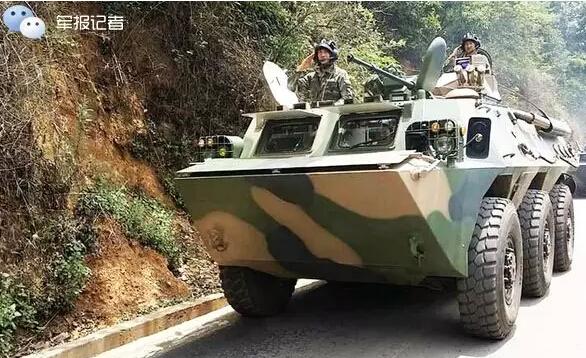PLA drill to safeguard China's interests
Updated: 2015-06-04 07:33
By Yang Danzhi(China Daily)
|
||||||||
 |
|
This photo released by the official WeChat account of PLA Daily shows an infantry fighting vehicle being deployed to take part in a live-ammunition drill which will start Tuesday in a border area of Yunnan province near Myanmar. |
China started a live-fire drill in Southwest China's Yunnan province near the Myanmar border on Tuesday after having notified Myanmar in advance. The military exercise, which involves troops from the People's Liberation Army and Air Force, is in accordance with accepted international practice and the agreement reached between China and Myanmar, the PLA Chengdu Military Area Command said on Monday.
China's Foreign Ministry spokeswoman Hua Chunying said the military exercise is "a regular activity within the scope of the military's mission". Since the misjudged bombings by Myanmar Air Force pursuing rebels in northern Myanmar in March and May killed some people in Yunnan, it was expected that China would take appropriate measures to protect its citizens living in areas near its border with Myanmar.
Despite all the diplomatic efforts to rebuild trust between the two countries, including Myanmar Foreign Minister U Wunna Maung Lwin's visit to Beijing in April when he officially apologized for the March bombing, the China-Myanmar border area is still restive. For instance, the bombing on May 14 in Yunnan's Zhenkang county reportedly injured at least five Chinese nationals.
Regarding the clashes between Myanmarese government forces and the northern rebel group, called the Myanmar National Democratic Alliance Army, China has made it clear that under no circumstances should its sovereignty and territorial integrity be violated, or its people or their properties harmed. In this sense, the Myanmarese government, who now plays a dominant role in the domestic conflict, should shoulder the major responsibility for the recent bombings.
Emphasizing its policy of non-intervention in Myanmar's internal affairs and hoping that Myanmarese people would reach a peaceful understanding to end the violence, China has maintained restraint to avoid complicating the already volatile situation in northern Myanmar. More importantly, China refuses to support either side in the conflict, though even its slightest involvement could make a world of difference for Myanmar.
However, if Myanmar's internal conflict continues to spill over into its territory, China will be given to understand that neither the Myanmarese government nor the northern rebel group respects China's legal interests and its request to maintain peace. In fact, China is holding the military drill to warn both sides engaged in the Myanmarese conflict not to violate its territorial integrity.
Unlike other Chinese drills, no specific goal or the end date of the ongoing drill in Yunnan has been announced, hinting that Beijing could adjust them and deploy more troops depending on the actual situation along the China-Myanmar border. In other words, a regular mechanism for safeguarding China's border security could come into being should Myanmar's internal conflict worsen.
Moreover, the PLA's training program near the China-Myanmar border highlights the importance of China's military and diplomatic reform at a time when security threats in its neighborhood are changing. China needs a pragmatic military policy to enable its military to immediately respond to emergencies and complicated situations such as the one along its border with Myanmar.
In the long run, political negotiations and diplomatic maneuvers will play a vital role in promoting healthy and stable China-Myanmar relations. But that does not mean China will unconditionally and indefinitely desist from using its military to tackle an emergency. To make its borders permanently peaceful, China has to pay equal attention to the above solutions, not least because they supplement each other.
The author is a researcher at the National Institute of International Strategy at the Chinese Academy of Social Sciences.
- Global health entering new era: WHO chief
- Brazil's planning minister steps aside after recordings revelation
- Vietnam, US adopt joint statement on advancing comprehensive partnership
- European border closures 'inhumane': UN refugee agency
- Japan's foreign minister calls A-bombings extremely regrettable
- Fukushima impact unprecedented for oceans: US expert

 Stars of Lijiang River: Elderly brothers with white beards
Stars of Lijiang River: Elderly brothers with white beards
 Wealthy Chinese children paying money to learn British manners
Wealthy Chinese children paying money to learn British manners
 Military-style wedding: Fighter jets, grooms in dashing uniforms
Military-style wedding: Fighter jets, grooms in dashing uniforms
 Striking photos around the world: May 16 - May 22
Striking photos around the world: May 16 - May 22
 Robots help elderly in nursing home in east China
Robots help elderly in nursing home in east China
 Hanging in the air: Chongqing holds rescue drill
Hanging in the air: Chongqing holds rescue drill
 2.1-ton tofu finishes in two hours in central China
2.1-ton tofu finishes in two hours in central China
 Six things you may not know about Grain Buds
Six things you may not know about Grain Buds
Most Viewed
Editor's Picks

|

|

|

|

|

|
Today's Top News
Liang avoids jail in shooting death
China's finance minister addresses ratings downgrade
Duke alumni visit Chinese Embassy
Marriott unlikely to top Anbang offer for Starwood: Observers
Chinese biopharma debuts on Nasdaq
What ends Jeb Bush's White House hopes
Investigation for Nicolas's campaign
Will US-ASEAN meeting be good for region?
US Weekly

|

|







